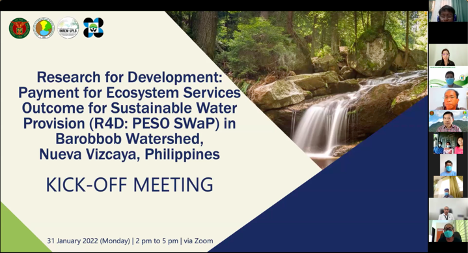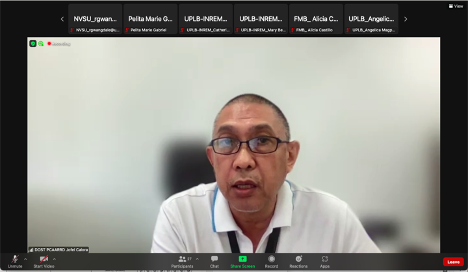
Strategies for maintaining and conserving Barobbob watershed, a vast forested area in Nueva Vizcaya, will soon be realized. This initiative is a collaboration among the University of the Philippines Los Baños -Interdisciplinary Studies Center on Integrated Natural Resources and Environment Management (UPLB-ISCINREM), Nueva Vizcaya State University (NVSU), and the Philippine Council for Agriculture, Aquatic and Natural Resources Research and Development of the Department of Science and Technology (DOST-PCAARRD).
Barobbob watershed provides domestic and agricultural water requirements of the province.
The project, “Research for Development: Payment for Ecosystem Services Outcome for Sustainable Water Provision (R4D: PESO SWAP) in Barobbob Watershed, Nueva Vizcaya,” will tap a conservation strategy, Payment for Ecosystem Services (PES), wherein communities will be remunerated in return of managing and maintaining the watershed.
“PES is important primarily because it encourages the maintenance of our natural ecosystems through environment-friendly practices. This also provides methods and strategies to improve rural areas,” said Dr. Feliciano G. Calora, Jr. Calora, DOST-PCAARRD’s Deputy Executive Director for R&D, hoped that a follow up project can be explored after the successful implementation of the PES project in Barobbob watershed.
Academician Juan M. Pulhin of UPLB said, the two-year project will be an action research that will lead to implementation of a PES-mechanism that is specific to the needs and context of the Barobbob watershed. He added that the learnings from the pilot testing will be used as reference and input to the formulation of a national policy on PES that may be pursued in the future.
To kick off the project, a meeting was held on January 31, 2022 with Nueva Vizcaya local government units (LGU) and various stakeholders. The meeting discussed and forged partnerships in the implementation of the project among stakeholders, including UPLB-ISCINREM and NVSU College of Forestry, Environment, and Resource Management.
The project was welcomed by representatives of the provincial and municipal LGUs, farmers organizations, water districts, and Department of Environmental and Natural Resources (DENR). They affirmed the importance of the project and expressed their support for its implementation, especially as the Barrobob watershed is a critical watershed located in the headwaters of Cagayan and the Magat river basin.

Dr. Asa Jose Sajise, UPLB professor and project staff, shared that the next steps for the project include stakeholder’s consultations, focus group discussions and key informant interviews with potential partners and supporters. This will be followed by the scientific phase where data gathering, watershed delineation, and surveys will be conducted; and finally drafting the PES implementation and monitoring plan. Sajise added that the meeting was a good opportunity to meet and get feedback from the various stakeholders present, which could be a starting point for building rapport and a working relationship for the project implementation.
In his concluding remarks, Engr. Giovannie Magat, Officer In Charge of the Nueva Vizcaya Provincial Environment and Natural Resources Office assured the project team of the DENR’s support. He said, “We will support it and of course I believe it will really contribute to the sustainability of our water resources. The support of DENR can be expected.”
The R4D: PESO SWAP Project is part of DOST-PCAARRD’s policy analysis and advocacy initiatives monitored by the Socio-Economics Research Division (Farah Y. Sevilla, DOST-PCAARRD S&T Media Services).
